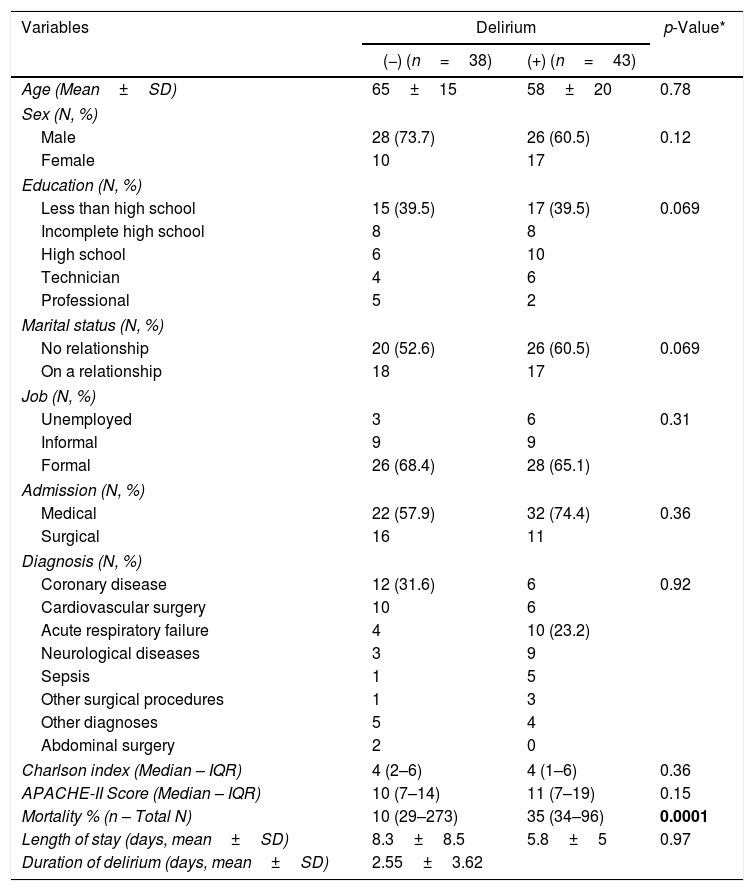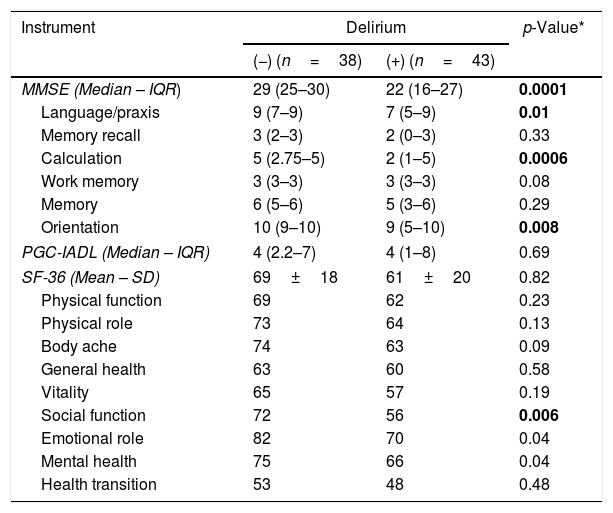There is scarce evidence of the impact of delirium on the post-ICU outcomes of critically ill patients. This study assessed the effect of delirium on cognitive function, functionality, and quality of life after three months from discharge in critically ill patients.
MethodsA nested case–control study was realized from April to September 2018. The prevalence of delirium and its association with mortality was assessed, and the alterations in cognition, functionality, and quality of life in survivors of critical illness three months after discharge from the ICU.
Results81 patients were included and evaluated with the CAM-ICU; 43 were defined as cases. The prevalence of delirium was 26%, and the mortality of patients with and without delirium was 35.4% vs. 10%, respectively. In the follow-up, the delirium group showed lower scores in the MMSE (p<0.01), with a specific decline in the subdomains of orientation, calculation, and language/praxis compared with the control group. The delirium group showed a decreased score in the SF-36, with a significant decline in social function, emotional role, and mental health (p<0.05). There were no differences observed in functionality measured by the PGC-IADL.
ConclusionsEducation strategies are required to increase delirium awareness in ICU teams. Support from a mental health interdisciplinary team is needed to guide the preventive and rehabilitation interventions for post-ICU patients.
Existe evidencia limitada acerca del impacto del delirium en los desenlaces post-UCI de los pacientes críticamente enfermos. Este estudio evalúo el impacto del delirium en la función cognitiva, funcionalidad y la calidad de vida después de tres meses del egreso en pacientes críticamente enfermos.
MétodosUn estudio de casos y controles anidado fue realizado entre abril y septiembre de 2018. La prevalencia de delirium y su asociación con la mortalidad fue evaluada y las alteraciones en la cognición, funcionalidad y la calidad de vida de sobrevivientes de enfermedad crítica a los tres meses de haber egresado de la Unidad de Cuidados Intensivos (UCI).
ResultadosOchenta y un pacientes fueron incluidos y evaluados con el Confusion Assessment Method for the Intensive Care Unit (CAM-ICU); 43 fueron definidos como casos. La prevalencia de delirium fue de 26%, y la mortalidad de los pacientes con y sin delirium fue de 35,4 vs. 10%, respectivamente. Durante el seguimiento, el grupo de delirium mostró peores puntajes en el Mini-mental State Examination (MMSE) (p < 0,01), con un deterioro específico en los subdominios de orientación, cálculo y lenguaje/praxia comparada con el grupo control. El grupo de delirium también evidenció un peor desempeño en el 36-Item Short Form Health Survey questionnaire (SF-36), con una disminución significativa de la función social, rol emocional y la salud mental (p < 0,05). No se observaron diferencias significativas en la funcionalidad a través del Philadelphia Geriatric Center-Instrumental Activities of Daily Living (PGC-IADL).
ConclusionesSe requieren estrategias educativas para incrementar la conciencia sobre el delirium en los equipos de UCI y se necesita del apoyo de un equipo interdisciplinario en salud mental para guiar las intervenciones de prevención y rehabilitación en los pacientes post-UCI.









